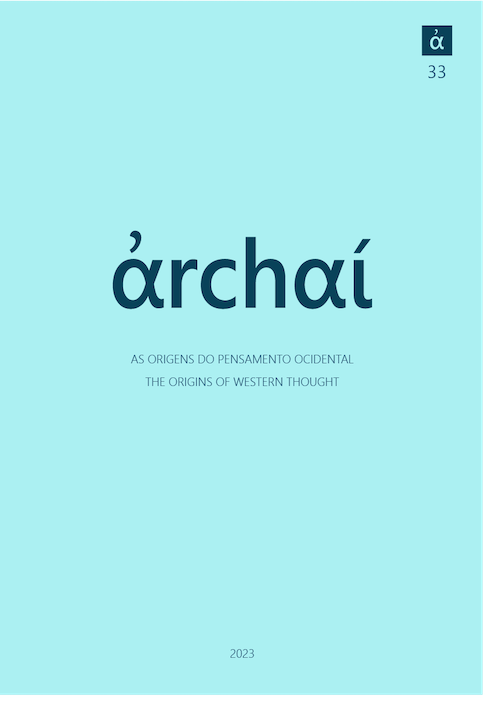La emoción esclava. Cólera, razón y responsabilidad moral en la ética aristotélica
DOI:
https://doi.org/10.14195/1984-249X_33_22Palavras-chave:
Aristóteles, Racionalidad, Emociones, EsclavoResumo
En el presente trabajo repasaré el modo en que Aristóteles entendió el vínculo entre razón y emoción -particularmente las acciones coléricas- a fin de mostrar que es debido a la presencia de factores intelectuales que las emociones resultan éticamente relevantes y no una mera reacción incontrolada. Luego reseñaré las repetidas analogías de las que se sirve Aristóteles entre la razón como amo y la cólera como esclavo para explicar el vínculo entre ambas. Mi aporte específico al tema consistirá en invertir dicha analogía y, en lugar de utilizarla como ejemplo del vínculo lógos-thymós, hacer de este último un ejemplo del vínculo despótes-doûlos tal como se lo describe en Política I. Si mi hipótesis es verosímil, establecer las acciones y la virtud propias del esclavo nos ayudará a echar luz sobre el tipo de moralidad propio de las acciones coléricas.
Downloads
Referências
ADKINS, A.W.H. (1970). From the Many to the One London, Constable & company.
BIEDA, E. (2022). La voluntad de la emoción. Cólera y pensamiento en la concepción aristotélica de la voluntariedad práctica. Daimon. Revista Internacional de Filosofía (en prensa). https://revistas.um.es/daimon/libraryFiles/downloadPublic/9661
BOERI, M. (2007). Apariencia y realidad en el pensamiento griego Buenos Aires, Colihue.
BROADIE, S. (1991). Ethics with Aristotle Oxford, Oxford University Press.
COOPER, J.M. (1988). Some remarks on Aristotle’s moral psychology. The Southern Journal of Philosophy XXVII, p. 25-42.
COPE, M. & SANDYS, E. (1877), Aristotle. Rhetoric, Cambridge University Press.
DOW, J. (2015). Passions and persuasion in Aristotle’s Rhetoric. Oxford, Oxford University Press .
FILLION-LAHILLE, J. (1970). La colère chez Aristote. Revue des Études Anciennes LXXII, 1-2, p. 46-79.
FORTENBAUGH, W.W. (1974). Aristotle on Emotion London, Duckworth.
FORTENBAUGH, W.W. (1977). Aristotle on Slaves and Women. En: BARNES, J.; SCHOFIELD, M.; SORABJI, R. (eds.). Articles on Aristotle 2. Ethics and Politics London, Duckworth .
FORTENBAUGH, W.W. (2006). Aristotle’s practical Side. On his Psychology, Ethics, Politics and Rhetoric Leiden-Boston, Brill.
FRANK, J. (2004). Citizens, Slaves and Foreigners: Aristotle on Human Nature. American Political Science Review XCVIII, 1, pp. 91-104.
GARDINER, H.N (1919). The Psychology of Affections in Plato and Aristotle. The Philosophical Review XXVIII, 1, pp. 1-26
GOODEY, C.F. (1999). Politics, Nature, and Necessity: Were Aristotle's Slaves Feeble Minded? Political Theory XXVII, 2, p. 203-224.
KNUUTTILA, S. (2004). Emotions in Ancient and Medieval Philosophy Oxford, Clarendon Press.
IRWIN, T. (1999). Aristotle. Nicomachean Ethics Translated, with introduction, notes and glossary. Indianapolis, Hackett.
KRAUT, R. (2002). Aristotle. Political Philosophy Oxford, Oxford University Press .
LORENZ, H. (2009). Virtue of Character in Aristotle’s Nicomachean Ethics. Oxford Studies in Ancient Philosophy XXXVII, p. 177-212.
NUSSBAUM, M. (2018). La ira y el perdón Mexico, FCE.
PELLEGRIN, P. (2013). Natural slavery. En: DESLAURIERS, M.; DESTRÉE, P. The Cambridge Companion to Aristotle’s Politics Cambridge, Cambridge University Press, p. 92-116.
RAMOS-UMAÑA, L. (2022). Filosofía del deseo. Aristóteles y el thymós Tópicos LXII, p. 65-95.
ROSSI, G. (2018). The Causal Structure of Emotions in Aristotle: Hylomorphism, Causal Interaction between Mind and Body, and Intentionality. En: BOERI, M. et. al. (eds). Soul and Mind in Greek Thought. Psychological Issues in Plato and Aristotle, New York, Springer, p. 177-198.
SHERMAN, N. (1991). The Fabric of Character Oxford, Clarendon Press , Oxford.
SIHVOLA, J. (1996). Emotional animals: Do Aristotelian emotions require beliefs? Apeiron 29, p. 105-144.
SIMPSON, P.L.P. (2014). The Great Ethics of Aristotle London; New York, Routledge.
Downloads
Publicado
Como Citar
Edição
Seção
Licença
Copyright (c) 2023 Esteban Bieda

Este trabalho está licenciado sob uma licença Creative Commons Attribution 4.0 International License.
Dado o acesso público desta revista, os textos são de uso gratuito, com obrigatoriedade de reconhecimento da autoria original e da publicação inicial nesta revista. O conteúdo das publicações é de total e exclusiva responsabilidade dos autores.
1. Os autores autorizam a publicação do artigo na revista.
2. Os autores garantem que a contribuição é original, responsabilizando-se inteiramente por seu conteúdo em caso de eventual impugnação por parte de terceiros.
3. Os autores garantem que a contribuição que não está em processo de avaliação em outras revistas.
4. Os autores mantêm os direitos autorais e concedem à revista o direito de primeira publicação, sendo o trabalho licenciado sob a Creative Commons Attribution License-BY.
5. Os autores têm permissão e são estimulados a publicar e distribuir seu trabalho on-line após a publicação na revista.
6. Os autores dos trabalhos aprovados autorizam a revista a, após a publicação, ceder seu conteúdo para reprodução em indexadores de conteúdo, bibliotecas virtuais e similares.
7. É reservado aos editores o direito de proceder ajustes textuais e de adequação do artigo às normas da publicação.



